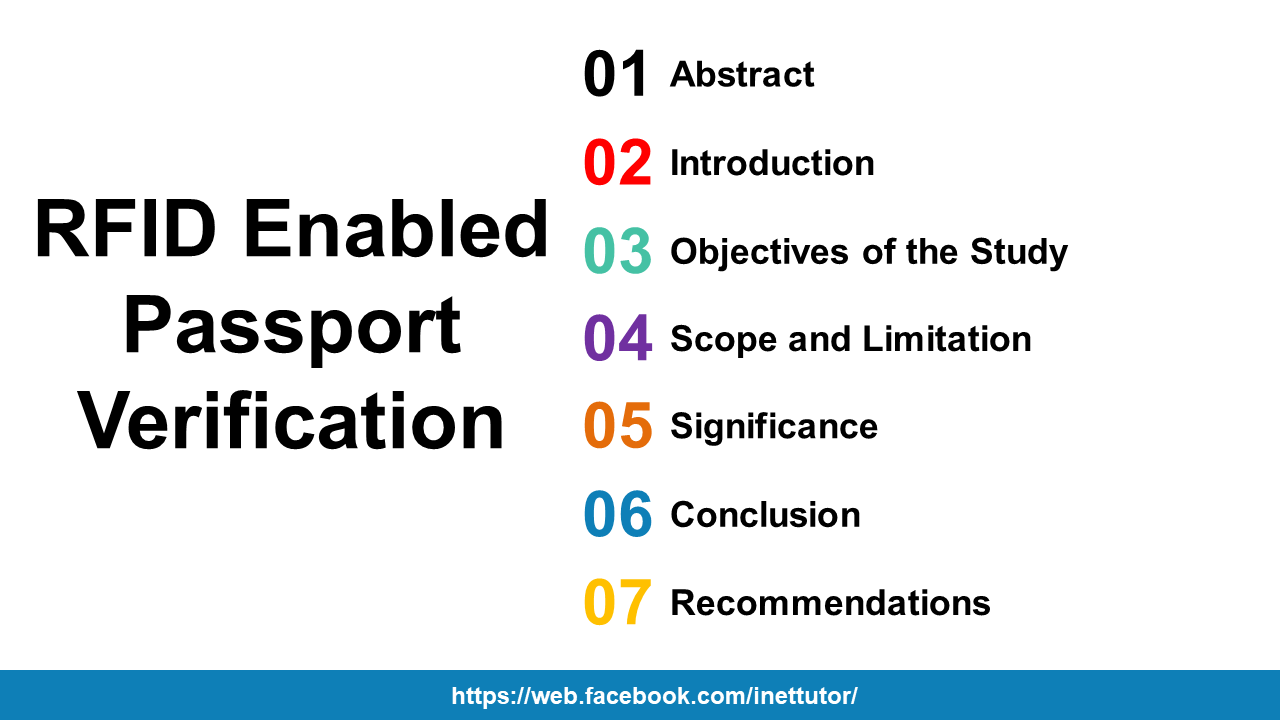RFID Enabled Passport Verification
Abstract
Table of Contents
The researchers conducted the study to assess the existing method of passport verification. The researchers have seen that the existing method of passport verification is not effective and exposes passport holders to serious threats since they are holding a paper-based passport where information can be easily accessed by others. The researchers have thought that the current system needs improvement for the safety and security of the passport details.
The most effective way to improve the security of the passport holder’s personal information is to automate the process of storing and verifying passports information. The researchers will develop an RFID-based passport where passengers will be provided with RFID tags that contain their passport information. They will scan their RFID tags into the RFID scanner in the airport for verification. The system will store the passport information electronically which makes it safe and secure.
The proposed system will be developed by the researchers using the Software Development Life Cycle (SDLC). After the development process, the project will be presented to the respondents and intended users for assessment of the system. IT experts will also evaluate the system to ensure the smooth functionality and operation of the system.
The implementation of the system will automate the whole process of passport verification by using RFID technology. The RFID-based passport verification will strengthen the security and privacy of the passport holders and avoid all serious threats. The verification process will be easy, highly reliable, safe, and secured.
The researchers highly recommend the implementation of the system to eliminate the conventional method which is prone to errors and threats. The project is an effective and efficient passport verification system.

Introduction of RFID Enabled Passport Verification
The capstone project, “RFID Enabled Passport Verification” will automate the process of verifying a passport. The said project will replace the use of paper passport booklets with the use of Radio Frequency Identification Device(RFID) technology where passport holders have their RFID tags that contains all their basic and authentic details that are scanned in an RFID reader for verification.
Passport is one of the requirements a person must have to travel across the world. Conventionally, passports are issued using a paper passport booklet to all passport holders. The paper passport contains the personal data of the owner which is very prone to threats. One biggest problem with the conventional paper passport is its privacy and security, for the information it contains can be easily revealed to those who can access it physically. People who are having paper passports are prone to identity theft, forgery, and other serious problems that may use their details.
Proposed Solution
To overcome the above-mentioned problems, the researchers of the study proposed an RFID-enabled passport verification. The said project will automate the whole process of passport verification by using RFID technology. Passports will be issued using RFID tags or cards that electronically contain all important data that must be included in a passport. The passport holder will swipe or scan their RFID tags or cards into the RFID reader that will compare the scanned data to the data of the passport holder in the system. The RFID-based passport verification will strengthen the security and privacy of the passport holders and avoid all serious threats.
Objectives of the Study
General Objective – The main goal of the project is to design and develop an RFID-enabled passport verification that will automate the process of verifying passports through the use of RFID technologies.
Specifically, the project aims the following objectives:
1. The system will enable automated verification of passports.
2. To develop a passport verification system that uses RFID technologies.
3. To design a passport system that will strengthen the privacy of passport details and information.
4. To develop a system that will remove paper-based passports that is prone to a lot of threats.
5. The RFID-enabled passport verification is safe and highly reliable.
Scope of the Study
The capstone project, “RFID Enabled Passport Verification” mainly focuses on designing, developing, and implementing an automated passport verification system. The said project will be based on RFID technology, passport holders will have RFID tags and airports will have an RFID scanner. The project is limited to storing the passport details in RFID tags and details will be compared to the data stored in the computer after scanning. The respondents of the project will be the intended users like passport holders and Immigration and Passport Control Officers.

Significance of the Study
The success of the project is deemed beneficial to the following individuals or groups:
Passport Holders. The success of the proposed system will provide them a great sense of security and privacy. The system will prevent them from being victims of identity theft, forgery, and other serious crimes that may use their personal information. The system will help them feel secure.
Immigration and Passport Control Officers. The verification system will help them ease up their job since they will not need to manually check the passports of the passengers.
Researchers. The researchers of the project will develop teamwork as well as enhance their knowledge and skills in developing successful projects.
Future Researchers. The project will serve as their basis in pursuing their project about the passport verification system.
Conclusion
Technological innovations have played a vital role in enhancing data privacy. Industries made use of computerized systems to store information and make it safe and secured. The researchers of the study conducted the project to investigate whether the current passport verification system is efficient and effective. After a thorough study and investigation, the researchers have seen that the current passport verification system is prone to serious threats and needs improvement. With this, the researchers developed an RFID-based passport verification system. The developed system was presented to the respondents and intended users.
The result of the study showed that the developed project met the needs and requirements of the respondents and the intended users. The majority of the respondents and the intended users have seen the potential of the system. The researchers concluded that the developed system is an effective and efficient tool to strengthen the privacy and security of the passport holder’s information. The system will eliminate all the errors and threats that are encountered in the existing system.
Recommendations
The researchers highly recommend the implementation of the system. The researchers strongly suggest that the passport verification system should be adapted to strengthen the privacy and security of passport information. The developed system will eliminate the errors and threats encountered in the current method of the passport verification system.
The researchers highly recommend the following:
1. The researchers highly recommend the implementation of the system in airports to automate the process of passport verification.
2. The developed system is suggested for its capacity to strengthen the privacy and security of passport details.
3. The system will make passport verification easy, fast, accurate, reliable, and convenient.
You may visit our Facebook page for more information, inquiries, and comments.
Hire our team to do the project.


